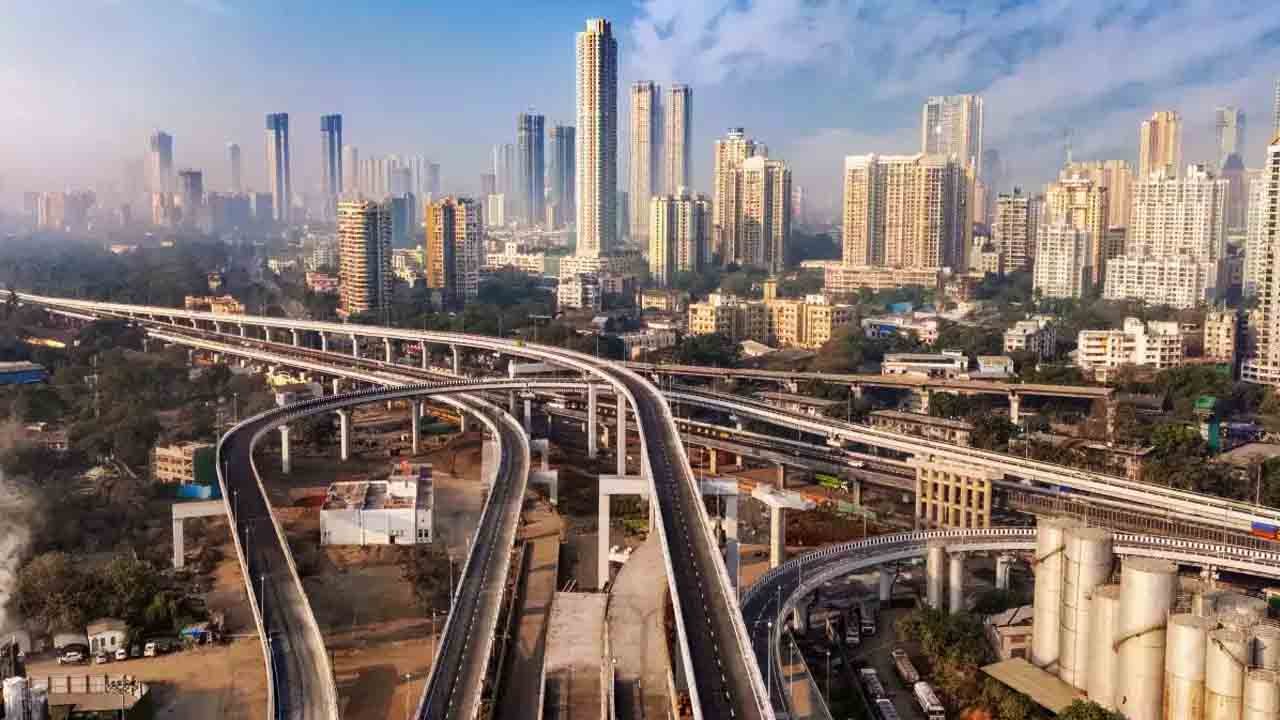Mumbai, India’s financial hub, is plagued by heavy traffic and poor infrastructure.
Additional Municipal Commissioner Ashwini Bhide, who is overseeing the projects, said this interconnected network will facilitate circular traffic movement, as well as solve the challenges associated with Mumbai’s linear geography.
In general, these projects greatly influence the lives and working activities of the city’s 22 million people.
To ease the situation, six important Mumbai Road Projects are being implemented:
Recommended: Mumbai Megaprojects
Table of Contents
1. Mumbai Trans-Harbour Link

The recently inaugurated Mumbai Trans-Harbour Link (MTHL), is India’s longest bridge on sea. It is approximately 22 km long, 16.5 km over sea and 5.5 km over land.
This marvel of engineering connects Mumbai with Navi Mumbai, giving passengers a safe and fast 20-minute journey between these two major locations. MTHL is a Free from traffic signals.
Japan International Cooperation Agency (JICA) has provided significant funding to this project costing approximately Rs 18,000 crore.
The trans-harbour link will speed up access to Navi Mumbai, make it a satellite city and contribute to urban expansion.
2. Mumbai Coastal Road Project

The first phase of the project extends 10.58 km from South Mumbai to Worli. The second phase involves connecting Kandivali Junction to Bandra Sea Link.
Once completed, the ambitious coastal road project (Phase 1) will add a sea promenade to the city between Priyadarshini Park on Nepean Sea Road and the Worli side of the Bandra Worli Sea Link, which will be 8.5 km long and 20 metres wide.
To reduce congestion on existing roads, the Brihanmumbai Municipal Corporation (BMC) has launched the Mumbai Coastal Road Project-South (MSRP) connecting the city’s western coastline.
The 12.19 metre diameter tunnel, India’s largest, carries three lanes of traffic to the south and north, 20 metres below the coast of the Arabian Sea and 70 metres below the Malabar Hill.
South Mumbai’s beaches, which have a long history of reclamation, are set for a dramatically changing coastal project. Once completed, the road will extend 100 metres inside the beach.
3. Sewri-Worli Elevated Connector Road

Sewri-Worli Elevated Connector (SWEC) is a four-lane, 4.512 km long structure to provide seamless connectivity to the east and west of Mumbai. As an essential part of The Mumbai Trans-Harbour Link, it is a robust traffic dispersal system.
The SWEC alignment meets Acharya Donde Marg, Jagannath Bhatankar Marg and finally Narayan Hardikar Marg near Worli, starting from MTHL’s Sewri Interchange on the east side of Sewri Railway Station.
The strategic alignment of SWREC forms a vital link between MTHL and Bandra Worli Sea Link/Coastal Road, providing signal-free and direct connectivity to both the sea links.
This connector saves a lot of time and avoids most of the hassle of journeys for people travelling from Navi Mumbai to Central and South Mumbai.
4. Nariman Point-Cuffe Parade Sea-Link

This will be the third sea bridge located in the southern part of Mumbai after Bandra-Worli and Sewri Nhava Sheva bridges.
Geographically, Colaba and Nariman Point are just over a kilometre apart, but using the city’s road network requires a distance of about five kilometres, which can take more than 20 minutes at peak times.
The route will be on the coast, in which specific points will be explained. The congestion reduction scheme will be implemented in Dean Road, Nariman Point, Hutatma Chowk and Colaba Causeway.
Nariman Point will make it easier for Colaba and Cuffe Parade residents to get to the Coastal Road. In November 2022, MMRDA had invited tenders for a civil construction project with a budget of Rs. 315 crores.
These projects, along with the planned development and planned sea link, when completed, will create a ring road around Mumbai. From the south, a number of component links will be built counterclockwise: Cuffe Parade-Nariman Point Link, Eastern Freeway, Mumbai Trans-Harbour Link, Sewri-Worli Link, and Bandra-Worli Sea Link.
5. Orange Gate-Marine Drive Tunnel

The 9.23 km long Orange Gate-Marine Drive Tunnel is set to connect Orange Gate of the Eastern Freeway and the coastal road at Marine Drive in Mumbai.
A twin-tube underground tunnel is being constructed at the center of this project, which is 6.51 km long and each tube has 2+2 traffic lanes, 1+1 emergency lanes and pedestrian walkways.
The development includes construction of a viaduct for vehicle entry at the Eastern Freeway Orange Gate and construction of open cuts and entry roads on both sides of the corridor. Specifically, the tunnel on the left will pass through the sea passage, which will surface again after BD Somani Chowk.
Additionally, it is connected to other important regional projects including the Sewri-Worli Elevated Connector, Mumbai Trans-Harbour Link, Eastern Freeway, Mumbai Coastal Road Project and Bandra-Worli Sea Link.
6. Thane-Borivali Link Road Project

The Thane-Borivali Link Road project, which was sanctioned in September 2015, is an important infrastructure milestone for Maharashtra. Currently, commuters are facing the challenges of Thane Ghodbunder Road (SH-42), which is a major link road for 23 km and takes 1 to 1.5 hours during peak hours.
The proposed solution of the scheme will reduce the distance from Thane to Borivali by 12 km. This tunnel will be built under Sanjay Gandhi National Park.
The main features of the 2+2 lane tunnel include a 10.25 km tunnel section, 1.55 km junction section and total length of 11.80 km. The 12.2 metre diameter tunnel has two lanes in each of the two tunnels, and cross connection lanes every 300 metres for smooth flow of traffic.
The detailed project report (DPR) states that the estimated cost will be around Rs 8,400 crore.
The integration of these divine projects marks a significant leap in Mumbai’s pursuit of infrastructural excellence and cements its position as a cosmopolitan city.

